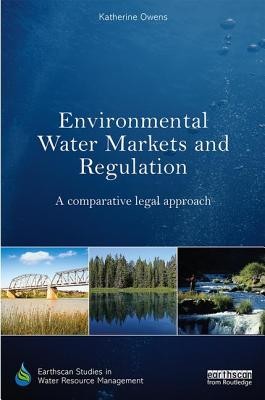
- We will send in 10–14 business days.
- Author: Katherine Owens
- Publisher: Routledge
- ISBN-10: 1138183202
- ISBN-13: 9781138183209
- Format: 16 x 23.6 x 1.5 cm, kieti viršeliai
- Language: English
- SAVE -10% with code: EXTRA
Reviews
Description
River systems around the world are degraded and are being used unsustainably. Meeting this challenge requires the development of flexible regimes that have the potential to meet essential consumptive needs while restoring environmental flows. This book focuses on how water trading frameworks can be repurposed for environmental water recovery and aims to conceptualise the most appropriate role for law in supporting recovery through these frameworks.
The author presents a comprehensive study of the legal frameworks in four jurisdictions: the States of Oregon and Colorado in the western United States; the province of Alberta in Canada; and the Murray-Darling Basin in Australia/Basin State of New South Wales. A close comparative analysis of these four jurisdictions reveals a variety of distinctive regulatory arrangements and collaborations between public and private actors. In all cases, the law has been deployed to steer and coordinate these water governance activities.
The book argues that each regime is based on a particular regulatory strategy, with different conceptions of the appropriate roles for, and relationships between, various actors and institutions. Legal frameworks do not have the capacity to rationalise and provide an overarching and absolute solution to the complex environmental and governance issues that arise in the context of environmental water transactions. Rather, the role of law in this context needs to be reconceptualised within the paradigm of regulatory capitalism as establishing and maintaining the limits within which regulatory participants can operate, innovate and collaborate.
EXTRA 10 % discount with code: EXTRA
The promotion ends in 22d.01:08:09
The discount code is valid when purchasing from 10 €. Discounts do not stack.
- Author: Katherine Owens
- Publisher: Routledge
- ISBN-10: 1138183202
- ISBN-13: 9781138183209
- Format: 16 x 23.6 x 1.5 cm, kieti viršeliai
- Language: English English
River systems around the world are degraded and are being used unsustainably. Meeting this challenge requires the development of flexible regimes that have the potential to meet essential consumptive needs while restoring environmental flows. This book focuses on how water trading frameworks can be repurposed for environmental water recovery and aims to conceptualise the most appropriate role for law in supporting recovery through these frameworks.
The author presents a comprehensive study of the legal frameworks in four jurisdictions: the States of Oregon and Colorado in the western United States; the province of Alberta in Canada; and the Murray-Darling Basin in Australia/Basin State of New South Wales. A close comparative analysis of these four jurisdictions reveals a variety of distinctive regulatory arrangements and collaborations between public and private actors. In all cases, the law has been deployed to steer and coordinate these water governance activities.
The book argues that each regime is based on a particular regulatory strategy, with different conceptions of the appropriate roles for, and relationships between, various actors and institutions. Legal frameworks do not have the capacity to rationalise and provide an overarching and absolute solution to the complex environmental and governance issues that arise in the context of environmental water transactions. Rather, the role of law in this context needs to be reconceptualised within the paradigm of regulatory capitalism as establishing and maintaining the limits within which regulatory participants can operate, innovate and collaborate.


Reviews